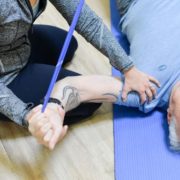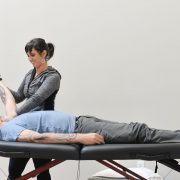Is Shoulder Pain “Impinging” on Your Lifestyle?
If you’ve ever had pain in your shoulders when you try to raise your arms overhead, pull off a sweatshirt, grab a gallon of milk from the fridge, or place grocery bags on the counter, you were likely dealing with shoulder “impingement syndrome…” otherwise known as “rotator cuff impingement” or “rotator cuff tendonitis.”
They call it “impingement” because your rotator cuff tendons get pinched between the round head of your shoulder bone and a hook-shaped bone in your shoulder blade called the acromion.
The pinching tends to happens every time you raise your arm above ninety degrees. After a while, the pinching eventually irritates your tendon, resulting in pain and inflammation. These symptoms are exacerbated and pronounced with any arm movements above shoulder height. Most of the time, the root cause of this problem has been there for a long time, but it’s only just now manifesting itself as pain — and this so-called “impingement syndrome.”
So what causes your rotator cuff tendon to get pinched or impinged in the first place?
Most of the time, the answer is POSTURE.
If your upper back is stiff, curved, and lacks adequate mobility, it’s going to impact how your shoulder blades move and position themselves. With a stiff and curved upper back, your shoulder blades will respond by moving out and up. This scenario makes that hook-like bone (the acromion) sit more forward and more down than it should. When this happens, there isn’t enough room for your tendon when you lift your arms above shoulder height. The bony surfaces above and below your tendon create friction, and this eventually turns into pain and inflammation.
The tempting and easy “fix” is to get a cortisone shot or attack the inflammation more conservatively with ice and topical anti-inflammatory agents.
But what you need to understand is that in most cases, “impingement syndrome” is actually the SYMPTOM. The root cause is usually coming from immobility and poor movement patterns in the upper back or neck. If you really want to get rid of your shoulder pain, get back to lifting and carrying things without any worry, and have full and free mobility of your arms, it’s essential that you identify and address the root cause and not just the symptoms. Since there is an 80% chance your shoulder pain is a mechanical or movement problem — the best people to examine and address this FIRST are movement experts like us.
So moral of the story… next time you go to the doctor complaining of shoulder pain and you hear the words “impingement syndrome” or “rotator cuff tendonitis” — don’t assume you need a cortisone shot or surgery to fix it.
Neither of these solutions will likely give you the long-term solution you’re looking for. The very last thing you want to do is get some kind of procedure or surgery that either masks the pain or corrects the wrong problem. You want to do everything possible to preserve the integrity of your tendon, and the best way to do that is by optimizing mobility and using natural movement and strength training prescribed by movement experts.
Interested in seeing if physical therapy could resolve your shoulder pain? Try a FREE Discovery Session on us. This is a chance for you to speak with one of our specialists, tell us everything that’s been going on with you, and determine for yourself if we’re the best people to help you. It’s a completely free, no-obligation appointment that will give you all the information you need to make the BEST decision for YOUR health – whether that’s working with us or not!



